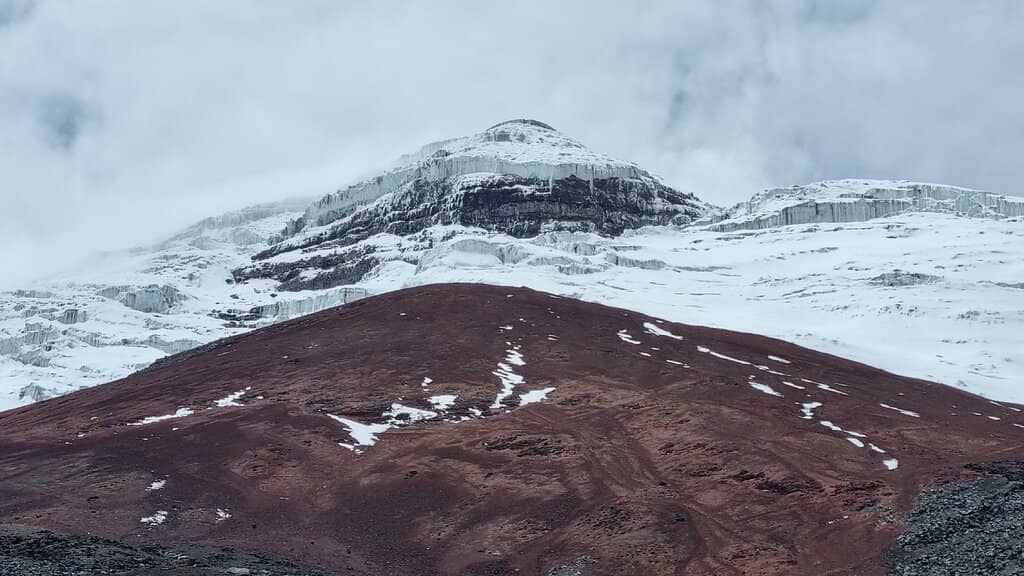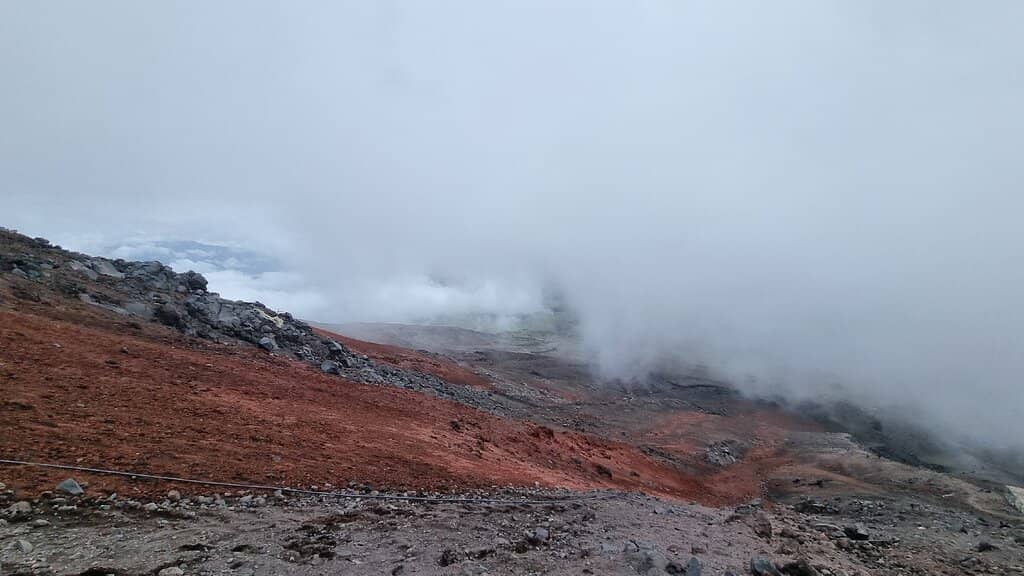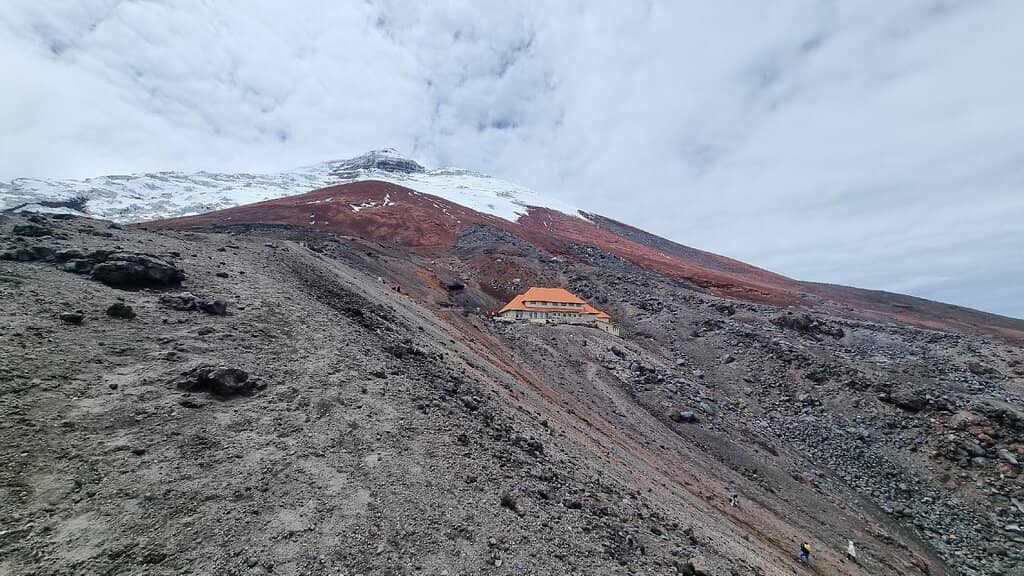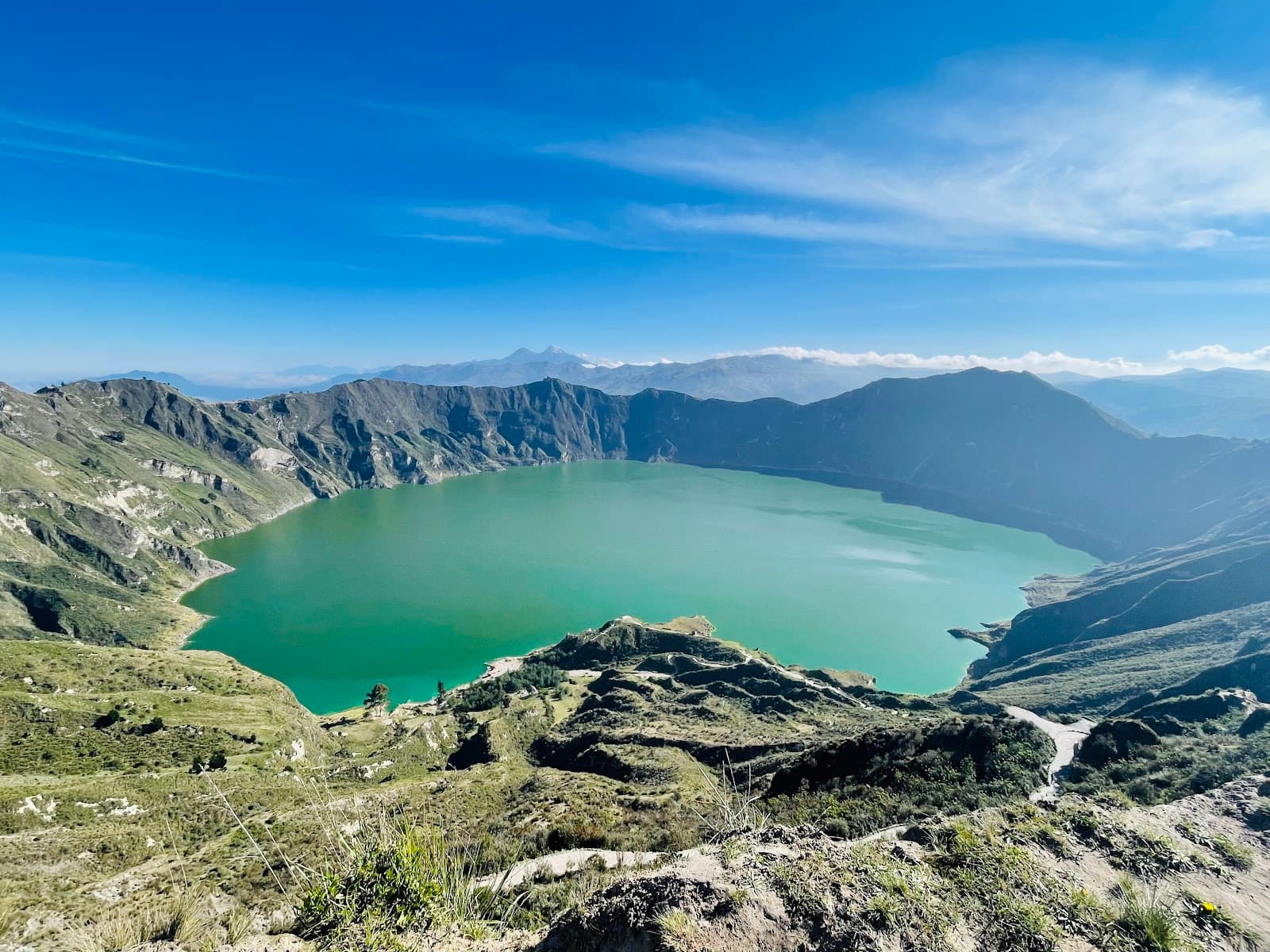
Cotopaxi National Park
Majestic active volcano in Ecuador, offering challenging hikes, stunning landscapes, and diverse wildlife within its national park.

Highlights
Must-see attractions

Social
From TikTok & Reddit
Best Time
Drier season, clearer views

Cotopaxi National Park
Best Time
Drier season, clearer views

Highlights
Must-see attractions
Majestic active volcano in Ecuador, offering challenging hikes, stunning landscapes, and diverse wildlife within its national park.
"The views were great. Tough hike to base camp, so bring lots of water and make sure you're ok with the altitude first."

Layer Up for All Weather
Pack multiple layers, including waterproofs and gloves. The weather changes rapidly! :cloudwithsnow:
Acclimatize to Altitude
Spend a day or two in Quito before hiking. Altitude sickness is real and can ruin your trip. :mountain_dew:

Highlights
Discover the most iconic attractions and experiences

Cotopaxi Volcano Summit
Cotopaxi National Park
The iconic, snow-capped stratovolcano offers challenging treks and breathtaking panoramic views.

Refuge Hike
Cotopaxi National Park
A rewarding climb to the Jose Rivas refuge, offering stunning vistas and a sense of accomplishment.

Wildlife Spotting
Cotopaxi National Park
Keep an eye out for Andean foxes, deer, and a variety of bird species in their natural habitat.
Plans like a pro.
Thinks like you
Planning Your Visit
Altitude Acclimatization is Key
Weather is Unpredictable
Best Times
Insider Tips
from TikTok, Instagram & Reddit
Layer Up for All Weather
Pack multiple layers, including waterproofs and gloves. The weather changes rapidly! :cloudwithsnow:
Acclimatize to Altitude
Spend a day or two in Quito before hiking. Altitude sickness is real and can ruin your trip. :mountain_dew:
Sturdy Hiking Boots Needed
Good grip is essential for the trails. Don't underestimate the terrain! :athletic_shoe:
Bring Plenty of Water
Stay hydrated, especially at higher elevations. Refills might be scarce. :droplet:
How hard is Cotopaxi, and itinerary advice
Tips
from all over the internet
Layer Up for All Weather
Pack multiple layers, including waterproofs and gloves. The weather changes rapidly! :cloudwithsnow:
Acclimatize to Altitude
Spend a day or two in Quito before hiking. Altitude sickness is real and can ruin your trip. :mountain_dew:
Sturdy Hiking Boots Needed
Good grip is essential for the trails. Don't underestimate the terrain! :athletic_shoe:
Bring Plenty of Water
Stay hydrated, especially at higher elevations. Refills might be scarce. :droplet:
Check Park Status
Volcanic activity can sometimes lead to temporary closures. Always check before you go. :warning:
What Travellers Say
Reviews Summary
Visitors consistently praise the breathtaking views and the majestic presence of Cotopaxi volcano. The challenging hike to the refuge is a highlight for many, offering a sense of accomplishment. However, unpredictable weather, including clouds obscuring the peaks, and the demanding altitude can impact the experience for some.
"Such an amazing experience. The views were great. Tough hike to base camp, so bring lots of water and make sure you're ok with the altitude first, it is tough.
I'd also suggest layering up pants and coats. Maybe gloves and definitely bring hiking shoes."
John Pozo
"Beautiful mountains. Solid climb to rest house. Took us almost 2 hours to climb the mountain and 45 minutes to come down. Someone in better condition could do it quicker."
Louis Samford
"Although the cloudy weather hid the mountain peaks, it was still a breathtaking place where I encountered a fox and experienced Ecuador’s natural fora."
Totti
What People Like
What People Dislike
Frequently Asked Questions
🚇 🗺️ Getting There
The most common way to reach Cotopaxi National Park from Quito is by car or organized tour. Driving takes about 1.5 to 2 hours. Many visitors opt for guided tours which often include transportation and a guide, simplifying logistics. Public transport is limited and can be time-consuming, often requiring multiple bus changes. :bus: :car:
Yes, a day trip to Cotopaxi National Park from Quito is very popular and feasible. Most day tours focus on reaching the refuge and exploring the lower slopes. Be prepared for an early start and a full day of activity. :clock_3:
Once inside the park, you'll typically travel by vehicle to various trailheads or viewpoints. For hikes like the one to the Jose Rivas refuge, you'll walk from the parking area. Some tours might offer 4x4 transport to higher points. :jeep:
While not strictly mandatory for all areas, hiring a guide is highly recommended, especially if you plan to hike to the refuge or summit. Guides provide safety, local knowledge, and can help with acclimatization. Many organized tours include a guide. :man_detective:
Taking a taxi directly from Quito to Cotopaxi National Park is possible but can be expensive. Negotiate the fare beforehand. It's often more cost-effective to join a tour or arrange transport through your accommodation. :taxi:
🎫 🎫 Tickets & Entry
The entrance fee for Cotopaxi National Park is typically around $10 USD per person. This fee can change, so it's always best to confirm current prices. Many organized tours include the park entrance fee in their package. :moneybag:
Yes, Cotopaxi National Park can experience temporary closures due to volcanic activity. It's crucial to check the official park status before your visit. Access to certain areas might also be restricted based on current conditions. :warning:
The park is generally open daily from around 8:00 AM to 5:00 PM. However, specific trails or the refuge might have different operating hours or be closed for maintenance or safety reasons. Always verify current access times. :calendar:
Tickets are usually purchased at the park entrance. For organized tours, booking in advance is necessary. If you are traveling independently, there's no need to book park entry tickets ahead of time, but confirm park status. :ticket:
While there isn't usually a strict daily visitor limit for general entry, access to the summit or specific trails might be regulated, especially during peak seasons or for safety reasons. Organized tours often manage group sizes. :peopleholdinghands:
🎫 ⛰️ Onsite Experience
The most popular hike is to the Jose Rivas refuge, located at 4,800 meters (15,748 feet). It's a challenging but rewarding trek offering incredible views. For a less strenuous option, consider the trails around the Limpiopungo lagoon. :hiking_boot:
The hike to the Jose Rivas refuge is considered strenuous due to the high altitude and steep incline. It typically takes 1-2 hours to ascend and about 45 minutes to descend. Proper acclimatization and good physical condition are essential. :muscle:
Layering is key! Wear moisture-wicking base layers, an insulating mid-layer (fleece or down jacket), and a waterproof/windproof outer shell. Bring sturdy hiking boots, gloves, a hat, and sunglasses. :park_park:
Yes, wildlife spotting is a highlight! You might see Andean foxes, deer, llamas, and various bird species like caracaras and Andean gulls. Keep a respectful distance and avoid feeding the animals. :fox:
Yes, there are designated camping areas within Cotopaxi National Park. Camping offers a unique opportunity to experience the park's tranquility and starry skies. Ensure you have appropriate gear for cold temperatures. :tent:
📸 📸 Photography
The views of the Cotopaxi volcano itself are paramount. The Limpiopungo lagoon offers stunning reflections of the volcano on calm days. The drive into the park also provides numerous scenic overlooks. :camerawithflash:
Early morning often provides the clearest views of the volcano before clouds roll in. Golden hour light in the late afternoon can also be beautiful, but be mindful of the park's closing time. :sunrise:
A wide-angle lens is great for capturing the vast landscapes. A telephoto lens can be useful for wildlife. Don't forget extra batteries, as the cold can drain them quickly. A sturdy tripod can help with low-light conditions. :camera:
Drone regulations can vary and are often subject to park management policies. It's best to check with park authorities or your tour operator beforehand to avoid any issues. :drone:
Include a person or a recognizable object in your frame to give a sense of scale. Shooting from different vantage points, like the lagoon or higher trails, can also emphasize the volcano's immense size. :arrowdownsmall:
For Different Travelers
Tailored advice for your travel style
👨👩👧 Families with Kids
Ensure children are well-hydrated and dressed in multiple warm layers. Snacks are essential to keep energy levels up. Many tours offer family-friendly options that cater to different fitness levels. The sheer scale of the volcano and the unique páramo landscape can be captivating for kids, offering an educational and adventurous experience.
🎒 Budget Travelers
Joining a group tour from Quito is often the most cost-effective way to visit, as it bundles transportation, park entrance fees, and sometimes a guide. Look for reputable tour operators offering day trips. Camping within the park is also a budget-friendly option if you have your own gear, offering a more immersive experience at a lower cost than lodges.
💑 Couples
Consider booking a guided tour that allows for flexibility, or rent a car for a more intimate exploration of the park's scenic routes. The opportunity to witness wildlife together and experience the raw beauty of the Andes can create lasting memories. Sunset views, if timed correctly before park closure, can be particularly stunning.
Deep Dives
In-depth insights and expert knowledge
Understanding Cotopaxi's Volcanic Nature
Despite its potential for activity, Cotopaxi offers incredible opportunities for adventure. The hike to the Jose Rivas refuge is a popular challenge, allowing visitors to experience the high-altitude environment and stunning views. The park also features other trails, such as those around the Limpiopungo lagoon, which are more accessible and offer chances to see wildlife and enjoy the unique páramo ecosystem.
For those interested in the geology and history of the region, learning about the volcano's past eruptions and its impact on the surrounding landscape can add another layer of appreciation to your visit. Understanding the dynamic nature of Cotopaxi enhances the awe-inspiring experience of being in its presence. Volcanic activity is a key characteristic of this region, shaping both its geography and its appeal to adventurers.
Preparing for the High Altitude
When you arrive at Cotopaxi, take it easy. Avoid strenuous activity immediately upon arrival. Drink plenty of water, as dehydration can exacerbate altitude sickness. Avoid alcohol and heavy meals. Many travelers recommend chewing coca leaves or drinking coca tea, traditional remedies for altitude sickness in the Andes. Listen to your body; if you feel unwell, descend to a lower altitude.
Proper physical preparation can also help. While you can't fully train for altitude at sea level, being in good cardiovascular shape will make the physical exertion of hiking at high altitudes more manageable. Remember that even a short hike to the refuge can feel much more challenging than expected due to the thin air. Acclimatization is the most crucial step for a safe and enjoyable visit.
What to Pack for Cotopaxi: A Traveler's Guide
For your feet, sturdy hiking boots with good ankle support and grip are essential. Trails can be rocky and uneven. Bring comfortable hiking socks. Other essentials include sunscreen (the sun is intense at high altitudes), sunglasses, and lip balm with SPF. A backpack to carry your essentials, including water, snacks, and extra layers, is a must.
Consider bringing a headlamp if you plan to be out late or are camping. A reusable water bottle is eco-friendly and practical. For photography enthusiasts, extra batteries are crucial as cold temperatures drain them quickly. Finally, a basic first-aid kit with any personal medications is always a good idea.






Social
from TikTok, Instagram & Reddit